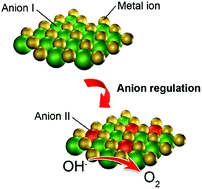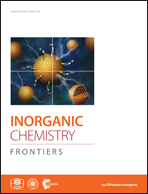A review of anion-regulated multi-anion transition metal compounds for oxygen evolution electrocatalysis
Abstract
The oxygen evolution reaction (OER) is a research focus in the clean energy field because it is the core reaction in electrochemical water splitting, rechargeable metal–air batteries, etc. OER is a complicated four-electron process; thus, it suffers from slow reaction rates. Therefore, the exploration of efficient OER electrocatalysts has become a significant topic in the research of advanced energy materials. Transition metal compounds exhibit great potential as highly active OER electrocatalysts, and rational regulations have been applied to boost their OER performance. Among these strategies, anion regulation is an emerging but effective method to improve the OER activity of transition metal compounds. In this review, recent advances in anion-regulated multi-anion transition metal compounds as OER catalysts are introduced, including the synthesis methods, the regulation of anions and their effects on OER activity. Anion regulation during OER tests, i.e. surface oxidation of the catalysts, is also discussed in this review. Then, studies are introduced according to the type of regulated anion. This review is expected to provide further insight into the composition and structure regulation of OER catalysts and inspire further research into transition metal-based energy materials.

- This article is part of the themed collection: 2018 Inorganic Chemistry Frontiers Review-type Articles


 Please wait while we load your content...
Please wait while we load your content...